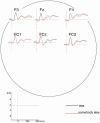Whodunnit? Electrophysiological correlates of agency judgements
- PMID: 22194878
- PMCID: PMC3237473
- DOI: 10.1371/journal.pone.0028657
Whodunnit? Electrophysiological correlates of agency judgements
Abstract
Sense of agency refers to the feeling that "I" am responsible for those external events that are directly produced by one's own voluntary actions. Recent theories distinguish between a non-conceptual "feeling" of agency linked to changes in the processing of self-generated sensory events, and a higher-order judgement of agency, which attributes sensory events to the self. In the current study we explore the neural correlates of the judgement of agency by means of electrophysiology. We measured event-related potentials to tones that were either perceived or not perceived as triggered by participants' voluntary actions and related these potentials to later judgements of agency over the tones. Replicating earlier findings on predictive sensory attenuation, we found that the N1 component was attenuated for congruent tones that corresponded to the learned action-effect mapping as opposed to incongruent tones that did not correspond to the previously acquired associations between actions and tones. The P3a component, but not the N1, directly reflected the judgement of agency: deflections in this component were greater for tones judged as self-generated than for tones judged as externally produced. The fact that the outcome of the later agency judgement was predictable based on the P3a component demonstrates that agency judgements incorporate early information processing components and are not purely reconstructive, post-hoc evaluations generated at time of judgement.
Conflict of interest statement
Figures




References
-
- Michotte A. The perception of causality. New York (US): Basic Books; 1946/1963.
-
- Sato A, Yasuda A. Illusion of sense of self-agency: Discrepancy between the predicted and actual sensory consequences of actions modulates the sense of self-agency, but not the sense of self-ownership. Cognition. 2005;94:241–255. - PubMed
-
- Synofzik M, Vosgerau G, Newen A. Beyond the comparator model: A multifactorial two-step account of agency. Consciousness and Cognition. 2008a;17:219–239. - PubMed
-
- Synofzik M, Vosgerau G, Newen A. I move, therefore I am: A new theoretical framework to investigate agency and ownership. Consciousness and Cognition. 2008b;17:411–424. - PubMed
-
- Farrer C, Frey SH, van Horn JD, Tunik E, Inati S, et al. The angular gyrus computes action awareness representations. Cerebral Cortex. 2008;18:254–261. - PubMed
Publication types
MeSH terms
LinkOut - more resources
Full Text Sources

